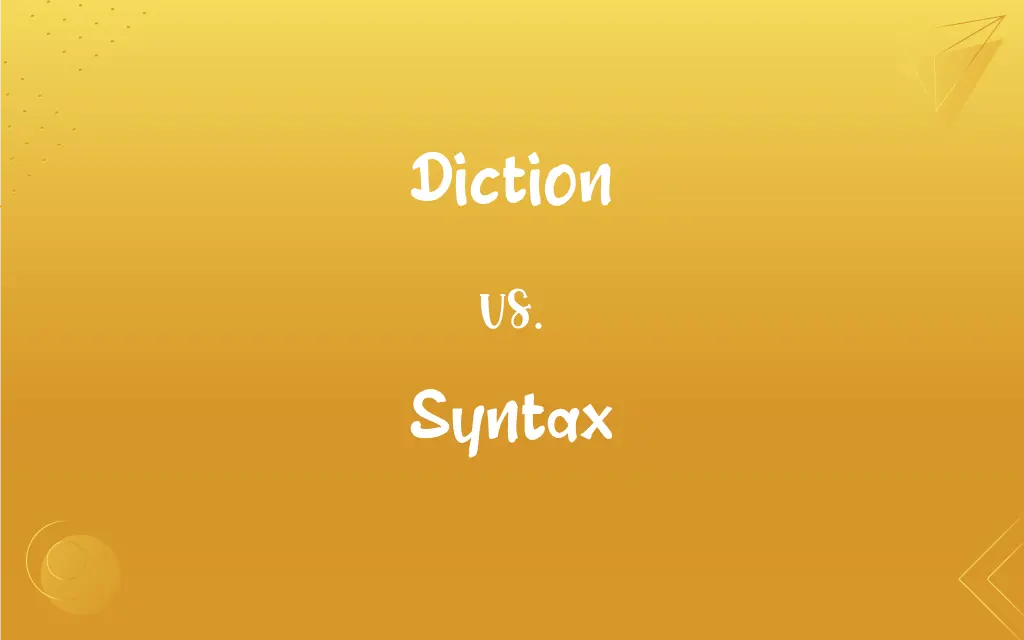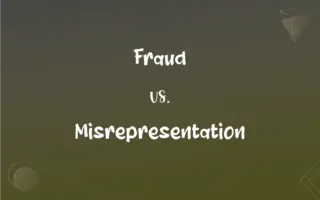Diction vs. Syntax: What's the Difference?
Edited by Aimie Carlson || By Harlon Moss || Updated on October 27, 2023
Diction refers to word choice and style, while syntax is the arrangement of words and phrases to create sentences.

Key Differences
Diction involves the selection of specific words to convey meaning, style, and tone. Syntax, on the other hand, is concerned with the structure of sentences, including the order of words and the relationship between them.
Effective diction enhances clarity and impacts the reader’s perception. Syntax determines the readability of a text, with its complex or simple structures shaping how information is processed.
Diction can be formal, informal, complex, or simple, influencing the overall feel of a text. Syntax can involve varying sentence lengths and structures, playing a crucial role in the flow and rhythm of the writing.
Diction is pivotal in creating imagery and setting the tone, using precise words for specific effects. Syntax, through varied patterns, can create emphasis, suspense, or clarity, impacting how the message is received.
In poetry, diction often involves deliberate word choices for rhythmic and aesthetic purposes. Syntax in poetry can involve unconventional structures to evoke emotions or create a particular pace.
ADVERTISEMENT
Comparison Chart
Definition
Choice and style of words
Arrangement of words in sentences
Role
Conveys meaning and tone
Determines sentence structure
Impact
Affects clarity and feeling
Influences readability and rhythm
Variation
Formal, informal, complex
Long, short, complex, simple
Use in Poetry
Creates rhythm and imagery
Shapes pace and emotional effect
ADVERTISEMENT
Diction and Syntax Definitions
Diction
Diction is the choice of words in speech or writing.
His diction was impeccable, choosing words that resonated with the audience.
Syntax
Syntax determines the grammatical structure of sentences.
His syntax was often unconventional, bending traditional grammatical rules.
Diction
Diction can be formal, informal, or colloquial.
Her informal diction made her poetry relatable and down-to-earth.
Syntax
Syntax can create emphasis, contrast, or suspense.
The suspenseful syntax kept readers on the edge of their seats, eager to know what happened next.
Diction
Diction involves selecting words for their clarity, power, or aesthetic effect.
The poet’s diction, rich in imagery, painted vivid pictures in the mind.
Syntax
Syntax can be simple, compound, complex, or compound-complex.
Her use of simple syntax made her instructions clear and easy to follow.
Diction
Diction reflects the writer’s or speaker’s style.
The novel’s formal diction perfectly captured the historical setting.
Syntax
Syntax influences the flow and rhythm of language.
The poet’s varied syntax added a dynamic rhythm to his verses.
Diction
Diction is key to establishing tone and mood.
The dark diction of the story set a somber and eerie mood.
Syntax
Syntax is the arrangement of words to form sentences.
The writer’s complex syntax created intricate and thought-provoking sentences.
Diction
Choice and use of words in speech or writing.
Syntax
The study of the rules whereby words or other elements of sentence structure are combined to form grammatical sentences.
FAQs
Can diction affect the tone of a piece?
Yes, diction plays a crucial role in setting the tone and mood of a piece.
Can diction be colloquial?
Yes, diction can be colloquial, formal, or informal, depending on the context and desired effect.
Does syntax play a role in creating emphasis?
Yes, syntax can be used to create emphasis, contrast, or suspense through sentence structure.
What is the main difference between diction and syntax?
Diction is about word choice and style, while syntax is about the arrangement and structure of words in sentences.
How does syntax influence readability?
Syntax affects how easily a text can be read and understood, with its structure influencing flow and clarity.
Can syntax be complex in literature?
Yes, some literary works use complex syntax to add depth and complexity to the text.
Can syntax affect the pace of a story?
Yes, syntax can influence the pace, slowing it down with complex structures or speeding it up with simple sentences.
How does syntax contribute to a writer’s voice?
Syntax contributes to a writer’s voice by shaping the way ideas are presented and the flow of the text.
Is diction important in poetry?
Yes, diction is especially important in poetry for creating rhythm, imagery, and conveying emotions.
Does diction contribute to a writer’s style?
Absolutely, diction is a key element of a writer’s or speaker’s style.
Is diction just about word choice?
Diction involves word choice and style, including the connotations and clarity of the words used.
Can diction influence a reader’s perception?
Yes, diction can strongly influence how readers perceive and react to a text.
Is syntax only about sentence length?
No, syntax also involves sentence complexity, structure, and the arrangement of clauses.
Can diction create imagery?
Yes, careful diction can create vivid imagery and sensory experiences in writing.
Do diction and syntax work together in writing?
Absolutely, diction and syntax work together to create the overall style, clarity, and effectiveness of writing.
Does syntax vary in different languages?
Yes, syntax rules and structures can vary significantly across different languages.
Is diction important in persuasive writing?
Yes, in persuasive writing, diction is crucial for clarity, impact, and establishing credibility.
Can syntax be intentionally broken for effect?
Yes, writers sometimes break conventional syntax rules for artistic or rhetorical effect.
How does syntax relate to grammar?
Syntax is a part of grammar, focusing on how words are arranged to form correct and effective sentences.
Can diction be too complex or simple?
Yes, depending on the context and audience, diction can be overly complex or overly simple, affecting clarity.
About Author
Written by
Harlon MossHarlon is a seasoned quality moderator and accomplished content writer for Difference Wiki. An alumnus of the prestigious University of California, he earned his degree in Computer Science. Leveraging his academic background, Harlon brings a meticulous and informed perspective to his work, ensuring content accuracy and excellence.
Edited by
Aimie CarlsonAimie Carlson, holding a master's degree in English literature, is a fervent English language enthusiast. She lends her writing talents to Difference Wiki, a prominent website that specializes in comparisons, offering readers insightful analyses that both captivate and inform.































































